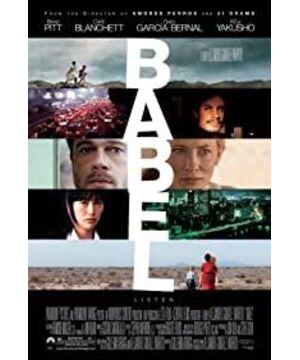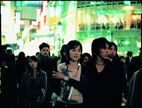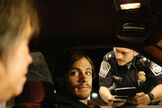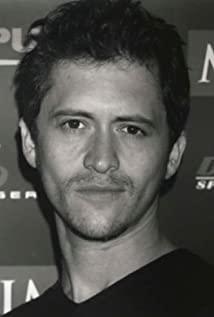The first time I learned about the film was probably at the end of last year, from an article on the blog of a Canadian film student. In fact, the author is not very optimistic about this film, but she did not say why. I think the most prominent flaw of this movie is the storytelling. In my opinion, this is indeed a movie with only a plot and no story. However, many times I think about it, maybe there are too many stories, but people can't feel the mystery in it?
The selling point of this movie, in addition to Blatt Peter, is that the director of the movie - a big director from India (my impression, maybe not) - unfortunately, I am very bad at remembering Indians name. Of course, the biggest selling point is the name Babel Tower itself. As many film critics have said, this film reflects the gap between people in modern society, and this gap comes from various obstacles in human communication.
That's right, it's true. From this film that spanned the Eurasian continent, I can unmistakably interpret the director's idea. What's more clear is that the director only opened his mouth, he only raised a very troublesome question, the answer - or there is, or not, you'll have to find it yourself - it's an even more hated thing.
You see, that dumb Japanese girl, when she found that she couldn't show her inner world in front of others, and was laughed at because of it, she chose a very violent method compared to women—— As she stands in the dining room, exposing her unclothed lower body to the air, she is delighted that she has finally caught the eye (the beginning of communication, of course, the desire to communicate. That's another topic). From then on, she hoped to use her body as a medium to gain recognition from others - when she proudly looked at her classmate's surprised eyes and quickly lifted up her short skirt, when she was there When the young cop is naked in front of her -- or she's just trying to find a way to communicate with people, for better or worse -- then she opens a Pandora's box.
If the film is compared to a geometry connected by dots that eventually draw a five-pointed star, then there is no doubt that the girl's father, the man who once traveled to Afghanistan and left a shotgun there, is the The center point of this five-pointed star, where it all started—maybe the gun. But anyway, we have to talk about this middle-aged widowed man - the father of a rebellious girl. To be honest, there are so few shots of this father in the film that I can only recall two or three scenes about him. A loving father, a middle-aged single man, a man who couldn't let go of his wife's death. Maybe that's it, we use these three images as three templates, or it can be applied to many men - men who take their own responsibilities numbly and mechanically.
Back to the topic of the gun. One year, a tourist from the civilized world, on a whim, left his favorite shotgun in a small village in Afghanistan that "has not yet enjoyed the grace of a civilized society". The new owner of the gun was a hunter who sold the gun to a shepherd who had two underage sons. If this family is compared to Afghanistan or Iraq today, then the hardships experienced by the three are equivalent, or even worse. After all, the family is broken. Regarding this plot, in case you have to understand it as the director's deliberate arrangement, and used to satirize our "fighter of the free world - the United States" with foreign guns and cannons to forcibly sell his "proud shotgun - the slogan of freedom" This act of going to this land of misery - you have to understand it this way, and I think it is also appropriate. But in my opinion, it's at most a black joke.
In short, the gun is now in the hands of these two little children. And, in order to verify his marksmanship, the younger brother, a child under 10 years old, stood on the top of the mountain and shot bullets at a bus approaching in the distance - a soup cart full of tourists from the civilized world. . About this child, there are several small fragments in the movie, and the most thought-provoking one is probably that after he peeped at his sister's naked body, he hid behind a rock and quickly rubbed his lower body with those little dry hands. lens. Rousseau believed that sex would greatly damage his health, so he chose to masturbate, and masturbated for the rest of his life. Then in essence, there is not much difference between the two, except that in our own minds, masturbation is used as a substitute for sex. But for a child less than ten years old, making love means transcending, and means not getting what you want. But the director added this suggestive scene here, what is he trying to do? Just to show the mischief of a child, or to tell this ancient country: don't expect things you didn't get, and will never get. Is that right? Is there something she hasn't tasted yet? American democracy? or something else?
Yet the Americans came, and were unfortunately shot by the fantasy child.
Sitting in the car, Peter and his wife were boredly swaying left and right on the country road with the rhythm of the car. However, this sudden bullet caused them to blow up a pot of porridge. Mrs. Peter was shot, and the bullet went into her shoulder blade - a deadly spot. So a car of people followed them to a nearby village and treated Mrs. Peter. But the injury will not heal for a while, and if she wants to move on, Mrs. Peter will surely die. I'm having an attack of laziness and want to cut corners. It's already 2,000 words) but the people in the car disagree, they find various reasons to refuse to stay in this place that makes them feel very uncomfortable, so they want to abandon Peter and his wife. God was pitiful, Peter contacted the embassy, and Mrs. Peter was transferred to the best local hospital for treatment.
The embassy also notified the police at this time, and with the efforts of the police, they found a few of the shepherd's family. Watching the police with guns, the shepherd's family chose to flee (the distrust of the government is evident from this). The misunderstanding arose, and the three escaped were chased by the police to a place halfway up the mountain. The police fired as if the bullets did not want money, and the father and son hid behind a big rock. The foreign language of this moment is: the government says you are guilty, and you are guilty—of course, in some emergency situations, "speaking" can also be exempted. The eldest son, a child after all, ran out of cover from the rocks and tried to run behind the mountain, but was shot. The younger son took the gun and fought back. To no avail, the old father shed tears and surrendered with his eldest son's body in his arms.
It seems like that's all there is to it. But it's far from over. The Peters have two children and hired a Mexican aunt to take care of them when they traveled to Afghanistan. But on this day the aunt's son is getting married, and she must go back to Mexico. She had no choice but to take her two children and go back to the small Mexican village in a car driven by her Mexican nephew. A perfect wedding, in addition to drinking is singing and dancing, as if people all over the world have the same way of entertainment.
It was night, and Auntie insisted on returning to the United States before the early hours of the morning. So the Mexican nephew still drove the three to the United States in that car. Miraculously, at an American checkpoint, the Mexican guy refused to be checked and ran away in his car. Of course Americans don't do it. In their eyes, everyone with suspicious behavior is a quasi-criminal - this concept is expressed unabashedly in the movie. On the way to escape, the guy from the country of Mexico unkindly "invited" the three of them out of the car and slipped away alone. So far, the aunt is very sad and helpless. It wasn't until the next morning that Auntie discovered that this was the desert area at the junction of the United States and Mexico. She left her two children alone to find rescue. At this time, the patrolling police appeared again, accusing the aunt of being an illegal worker. Aunt's defense is pale, the government says you are an illegal worker, and you are. The aunt said that there are two children over there, and there is no water to drink in the desert. The government took the aunt to look around, but couldn't find the child, so it took the aunt away, leaving behind only a piece of yellow sand and two children who didn't know where they were.
The last paragraph of the film is the most complete part of the story, but it has lost that sharp lens language. When Big Mom was taken away by the police, her defense was all in Mexican, which at first puzzled me. Because except for the part about the wedding in Mexico, all of Big Mom's dialogue is in English. But why did she speak Mexican in such an emergency, so that the police were even more convinced of the identity of the aunt's illegal laborer. Why? Gradually, I remembered several other clips in the film. For example, the behavior of the shepherd's family of three and the police shooting at guns, the behavior of the aunt's Mexican nephew suddenly running away at the checkpoint, and the Mexican language of the aunt at this time. What does all this mean? Look at the background again, and suddenly it becomes clear. The director just wanted to say that when human beings are faced with the oppression of some kind of powerful force, they will often react very differently from usual. When the power is directed at an individual, then it is the man's own misfortune, but when the power is above the crowd, and the whole crowd invariably acts the same, unconsciously abnormal behavior , then it is the misfortune and sorrow of this society. Isn't the human bomb in Iraq a good example? Sad collective disorder, and even sadder ignorance of this collective disorder.
The story of the movie is finally over. However, it left many big question marks in my heart. Throughout the film, from beginning to end, the story is dominated by some accidents. And these accidents are precisely created by the people around the characters in the film. The characters in the film can't grasp the behavior of the people around them, which leads to accidents again and again, and other accidents born from these accidents. , just like waves, spreading out layer by layer, the only difference from waves is that their power is not weakened by the spread, but like a snowball, it gets thicker and thicker, and eventually it can't be picked up.
But why are we unable to grasp the behavior of those around us that can ultimately affect us? Is it because the theme of the film says, is it because of the estrangement in communication? Is it because of people's desire to understand less and less of each other? Is it because people are getting more and more addicted to their own world and unable to extricate themselves? Is it because people finally give up their beliefs and only believe that the only God in this world is the "I" of this world in their hearts? Everything is unknown.
View more about Babel reviews










